 16 citations,
February 2022 in “Science Advances”
16 citations,
February 2022 in “Science Advances” Follistatin and LIN28B together improve the ability of inner ear cells in mice to regenerate into hearing cells.
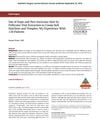 13 citations,
September 2015 in “Aesthetic Surgery Journal”
13 citations,
September 2015 in “Aesthetic Surgery Journal” Transplanting hair from the nape and around the ear to the hairline and temples generally satisfies patients and looks natural.
 8 citations,
June 2021 in “International Journal of Molecular Sciences”
8 citations,
June 2021 in “International Journal of Molecular Sciences” Exosomes from umbilical cord cells fix hearing loss and damaged ear hair cells in mice.
 5 citations,
November 2021 in “Frontiers in Cell and Developmental Biology”
5 citations,
November 2021 in “Frontiers in Cell and Developmental Biology” Caffeine can damage hearing cells and affect hearing recovery after ear trauma.
 5 citations,
October 2016 in “European Journal of Obstetrics & Gynecology and Reproductive Biology”
5 citations,
October 2016 in “European Journal of Obstetrics & Gynecology and Reproductive Biology” Women with PCOS may have a higher risk of respiratory and ear infections due to slower nasal mucociliary clearance.
 4 citations,
December 2022 in “Frontiers in cell and developmental biology”
4 citations,
December 2022 in “Frontiers in cell and developmental biology” Zebrafish larvae are used to study and find treatments for ear cell damage because they are easier to observe and test than mammals.
 2 citations,
January 2005 in “Elsevier eBooks”
2 citations,
January 2005 in “Elsevier eBooks” The document describes skin diseases affecting the outer ear in dogs and cats, their spread to other body parts, and treatment options.
 January 2024 in “Biological Research”
January 2024 in “Biological Research” Tiny particles from stem cells can help protect ear cells from antibiotic damage by helping cells remove damaged parts.
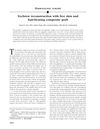 10 citations,
December 1999 in “Journal of The American Academy of Dermatology”
10 citations,
December 1999 in “Journal of The American Academy of Dermatology” The technique of using a skin and hair graft from behind the ear successfully reconstructed a large eyebrow defect with good cosmetic results.
4 citations,
June 1988 in “The American journal of cosmetic surgery” The technique removes pitted scars by replacing them with skin from behind the ear and then smoothing the area after a few weeks.
 1 citations,
January 2024
1 citations,
January 2024 CaBP1 and CaBP2 are necessary for proper hearing and neurotransmission in the ear's inner hair cells.
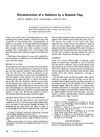 1 citations,
June 1979 in “The Journal of Dermatologic Surgery and Oncology”
1 citations,
June 1979 in “The Journal of Dermatologic Surgery and Oncology” Doctors successfully rebuilt a sideburn using skin and hair from near the ear in one surgery.

CaBP1 and CaBP2 are necessary for proper hearing and neurotransmission in the ear's inner hair cells.

CaBP1 and 2 are necessary for maintaining calcium currents and hearing in inner ear cells.

CaBP1 and CaBP2 are important for continuous hearing by preventing inactivation of calcium currents in ear cells, with CaBP2 also able to restore hearing when reintroduced.
 January 2024 in “Biochemical and Biophysical Research Communications”
January 2024 in “Biochemical and Biophysical Research Communications” Lack of zinc can cause hearing loss by damaging important parts of inner ear cells in mice.
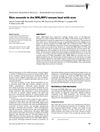 51 citations,
January 2006 in “Wound Repair and Regeneration”
51 citations,
January 2006 in “Wound Repair and Regeneration” MRL/MpJ mice's skin wounds heal with scars, unlike their ear wounds which can regenerate.
 44 citations,
February 2012 in “The journal of neuroscience/The Journal of neuroscience”
44 citations,
February 2012 in “The journal of neuroscience/The Journal of neuroscience” Mutations in the PTPRQ gene cause significant balance issues in mice due to hair bundle defects in the inner ear.
 7 citations,
January 1996 in “In Practice”
7 citations,
January 1996 in “In Practice” The document concludes that a thorough examination and various tests are crucial for diagnosing and treating ear inflammation in pets.
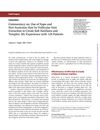 1 citations,
September 2015 in “Aesthetic Surgery Journal”
1 citations,
September 2015 in “Aesthetic Surgery Journal” Dr. Umar successfully used softer hair from the nape and around the ear for natural-looking hairlines in 128 patients, with some concerns about hair loss over time.

CaBP1 and CaBP2 are important for maintaining hearing by supporting continuous calcium currents and nerve signaling in the ear.

CaBP1 and 2 are important for maintaining the activity of calcium channels necessary for hearing in inner ear cells.
 July 2019 in “Journal of the Formosan Medical Association”
July 2019 in “Journal of the Formosan Medical Association” Melatonin may help with nerve pain, a hepatitis C drug is effective but has side effects, a treatment for mouth sores works but can cause blood issues, ear reconstruction with an implant is safe, HIV transmission from mother to child in Taiwan is now 0% with treatment, certain blood problems are more common in people with a tongue condition, a gene and being overweight are linked to hair loss in some women, a new technique could reduce radiation for lung nodule patients, a hepatitis treatment may lower cancer recurrence after a procedure, and adding extra screening improves tuberculosis detection in patients with lung infections.
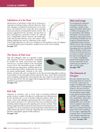 May 2015 in “Journal of Investigative Dermatology”
May 2015 in “Journal of Investigative Dermatology” Melanoma risk tools need improvement, a gene mutation causes a hair disorder that might be treated by managing cell stress, a potential therapy for a skin-ear disorder involves blocking cell channels, skin wrinkling may indicate lung aging regardless of smoking, and oxidative stress might contribute to common baldness.
 24 citations,
November 2023 in “Nature”
24 citations,
November 2023 in “Nature” The extracellular matrix affects where tumors can start in the body.
 15 citations,
January 2023 in “Biomaterials Research”
15 citations,
January 2023 in “Biomaterials Research” 3D bioprinting in plastic surgery could lead to personalized grafts and fewer complications.
 1 citations,
August 2012 in “Journal of acupuncture and meridian studies”
1 citations,
August 2012 in “Journal of acupuncture and meridian studies” Traditional Korean medicine combined with modern technology may improve hair removal treatments.
June 2017 in “Mechanisms of development” Hox genes control hair follicle stem cell regeneration in different body regions.
65 citations,
April 2000 in “The Laryngoscope” Clotrimazole, miconazole, and tolnaftate are likely safe, but gentian violet is risky.
 47 citations,
April 2017 in “European Journal of Pharmaceutics and Biopharmaceutics”
47 citations,
April 2017 in “European Journal of Pharmaceutics and Biopharmaceutics” The new dutasteride formula can be applied to the skin, may promote hair growth, and has fewer side effects.



























